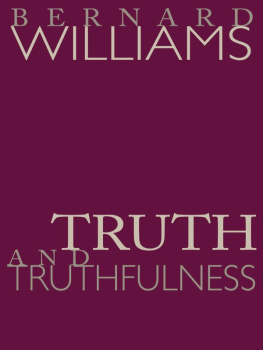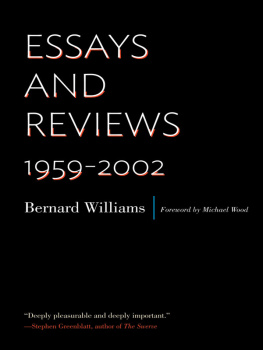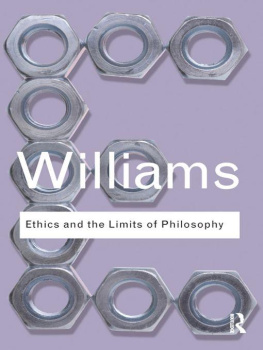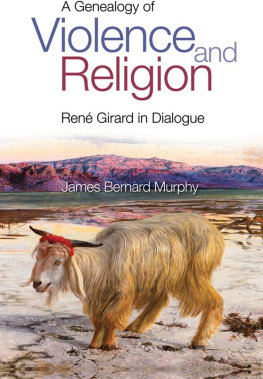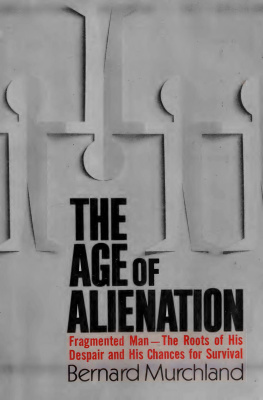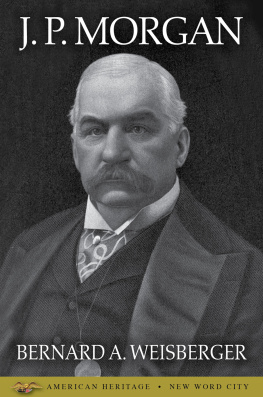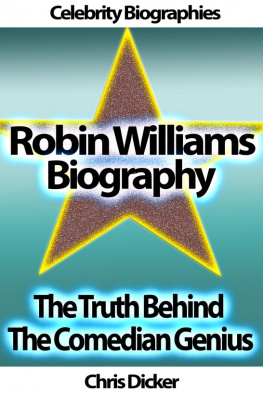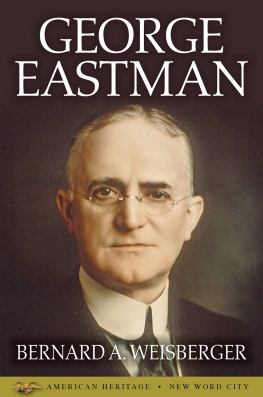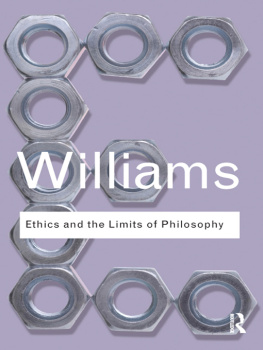Bernard Williams - Truth and Truthfulness: An Essay in Genealogy
Here you can read online Bernard Williams - Truth and Truthfulness: An Essay in Genealogy full text of the book (entire story) in english for free. Download pdf and epub, get meaning, cover and reviews about this ebook. City: Princeton, N.J., year: 2002, publisher: Princeton University Press, genre: Religion. Description of the work, (preface) as well as reviews are available. Best literature library LitArk.com created for fans of good reading and offers a wide selection of genres:
Romance novel
Science fiction
Adventure
Detective
Science
History
Home and family
Prose
Art
Politics
Computer
Non-fiction
Religion
Business
Children
Humor
Choose a favorite category and find really read worthwhile books. Enjoy immersion in the world of imagination, feel the emotions of the characters or learn something new for yourself, make an fascinating discovery.
- Book:Truth and Truthfulness: An Essay in Genealogy
- Author:
- Publisher:Princeton University Press
- Genre:
- Year:2002
- City:Princeton, N.J.
- Rating:4 / 5
- Favourites:Add to favourites
- Your mark:
- 80
- 1
- 2
- 3
- 4
- 5
Truth and Truthfulness: An Essay in Genealogy: summary, description and annotation
We offer to read an annotation, description, summary or preface (depends on what the author of the book "Truth and Truthfulness: An Essay in Genealogy" wrote himself). If you haven't found the necessary information about the book — write in the comments, we will try to find it.
Truth and Truthfulness: An Essay in Genealogy — read online for free the complete book (whole text) full work
Below is the text of the book, divided by pages. System saving the place of the last page read, allows you to conveniently read the book "Truth and Truthfulness: An Essay in Genealogy" online for free, without having to search again every time where you left off. Put a bookmark, and you can go to the page where you finished reading at any time.
Font size:
Interval:
Bookmark:
Copyright 2002 by Princeton University Press
Published by Princeton University Press, 41 William Street, Princeton, New Jersey 08540
In the United Kingdom: Princeton University Press,
3 Market Place, Woodstock, Oxfordshire OX20 1SY
All Rights Reserved
Library of Congress Cataloging-in-Publication Data
Williams, Bernard Arthur Owen.
Truth and truthfulness : an essay in genealogy / Bernard Williams.
p. cm.
Includes bibliographical references and index.
eISBN: 978-1-40082-514-1
1. Truth. 2. Truthfulness and falsehood. I. Title.
BD171 .W528 2002
121dc212002023663
British Library Cataloging-in-Publication Data is available
This book has been composed in Janson Typeface
Printed on acid-free paper.
www.pupress.princeton.edu
Printed in the United States of America
1 3 5 7 9 10 8 6 4 2
 FOR
FOR
REBECCA, JACOB, JONATHAN,
AND SAM
I have always had a high regard for those who defend grammar or logic.
One realizes fifty years later that they have warded off great dangers.
PROUST (M. de Charlus)

Lack of an historical sense is the hereditary defect of philosophers
... So what is needed from now on is historical philosophizing,
and with it the virtue of modesty.
NIETZSCHE
Contents


THE PROBLEM
1. Truthfulness and Truth
Two currents of ideas are very prominent in modern thought and culture. On the one hand, there is an intense commitment to truthfulnessor, at any rate, a pervasive suspiciousness, a readiness against being fooled, an eagerness to see through appearances to the real structures and motives that lie behind them. Always familiar in politics, it stretches to historical understanding, to the social sciences, and even to interpretations of discoveries and research in the natural sciences.
Together with this demand for truthfulness, however, or (to put it less positively) this reflex against deceptiveness, there is an equally pervasive suspicion about truth itself: whether there is such a thing; if there is, whether it can be more than relative or subjective or something of that kind; altogether, whether we should bother about it, in carrying on our activities or in giving an account of them. These two things, the devotion to truthfulness and the suspicion directed to the idea of truth, are connected to one other. The desire for truthfulness drives a process of criticism which weakens the assurance that there is any secure or unqualifiedly stateable truth. Suspicion fastens, for instance, on history. Accounts which have been offered as telling the truth about the past often turn out to be biassed, ideological, or self-serving. But attempts to replace these distortions with the truth may once more encounter the same kind of objection, and then the question arises, whether any historical account can aim to be, simply, true: whether objective truth, or truth at all, can honestly (or, as we naturally put it, truthfully) be regarded as the aim of our inquiries into the past. Similar arguments, if not quite the same, have run their course in other fields. But if truth cannot be the aim of our inquiries, then it must surely be more honest or truthful to stop pretending that it is, and to accept that... : and then there follows some description of our situation which does without the idea of truth, such as that we are engaged in a battle of rhetorics.
We can see how the demand for truthfulness and the rejection of truth can go together. However, this does not mean that they can happily co-exist or that the situation is stable. If you do not really believe in the existence of truth, what is the passion for truthfulness a passion for? Oras we might also put itin pursuing truthfulness, what are you supposedly being true to? This is not an abstract difficulty or just a paradox. It has consequences for real politics, and it signals a danger that our intellectual activities, particularly in the humanities, may tear themselves to pieces.
The tension between the pursuit of truthfulness and the doubt that there is (really) any truth to be found comes out in a significant difficulty, that the attack on some specific form of truth, such as the case I have mentioned, historical truth, itself depends on some claims or other which themselves have to be taken to be true.
The point that the undermining of some history needs other history is correct and not to be forgotten, but it cannot by itself remove the tensions and put an end to the problem. Such arguments may merely be added to the problem and, as has often happened in recent years, accelerate a deconstructive vortex. Of course all such discussions have their time, and the intense criticism in this spirit that was for a while directed to such things as literary interpretation and the possibility of objective history may now, to some extent, be passing. But this does not mean that the real problems have gone away. Indeed, the real problems have been there, as Nietzsche understood, before the label of post-modernism made them a matter of public debate, and they remain there now. Moreover, there is a danger that the decline of the more dramatic confrontations may do no more than register an inert cynicism, the kind of calm that in personal relations can follow a series of hysterical rows. If the passion for truthfulness is merely controlled and stilled without being satisfied, it will kill the activities it is supposed to support. This may be one of the reasons why, at the present time, the study of the humanities runs a risk of sliding from professional seriousness, through profes-sionalization, to a finally disenchanted careerism.
My question is: how can we address this situation? Can the notions of truth and truthfulness be intellectually stabilized, in such a way that what we understand about truth and our chances of arriving at it can be made to fit with our need for truthfulness? I believe this to be a basic problem for present-day philosophy.
The tensions in our present culture that are generated by this problem, the tensions (as I summarily put it) between truth and truthfulness, break out in several styles of conflict. One is that between two views of the Enlightenment. It is a familiar theme of contemporary criticism, one that has been inherited from some members of the Frankfurt School, and I shall refer to his formulations in various connections. The position he calls liberal irony has particularly attracted attention by not wanting to affirm its own truth, but that is not the most important issue it raises. The most significant question is not about the truth-status of political or moral outlooks themselves. It is about the importance that those outlooks attach to other kinds of truth, and to truthfulness.
The tensions in our culture between truth and truthfulness are also expressed in a familiar contrast between two different ways of doing philosophy. I do not mean by this the supposed distinction between analytic and continental styles in philosophy: besides being, on any showing, dramatically misnamed, this does not represent any one contrast at all. On the questions that concern me here, there is a different distinction. On one side, there is a style of thought that extravagantly, challengingly, oras its opponents would sayirresponsibly denies the possibility of truth altogether, waves its importance aside, or claims that all truth is relative orsuffers from some other such disadvantage. To help the argument along, I need a general term to pick out those who adopt this kind of outlook. The term will necessarily be vague: several different views fall within the outlook, and some writers who have the outlook do not distinguish too carefully the particular view they hold. In earlier drafts of this book I called them sceptics about truth, but that was misleading, because scepticism brings with it from the philosophical tradition too heavy a suggestion that the problems concern our
Next pageFont size:
Interval:
Bookmark:
Similar books «Truth and Truthfulness: An Essay in Genealogy»
Look at similar books to Truth and Truthfulness: An Essay in Genealogy. We have selected literature similar in name and meaning in the hope of providing readers with more options to find new, interesting, not yet read works.
Discussion, reviews of the book Truth and Truthfulness: An Essay in Genealogy and just readers' own opinions. Leave your comments, write what you think about the work, its meaning or the main characters. Specify what exactly you liked and what you didn't like, and why you think so.

